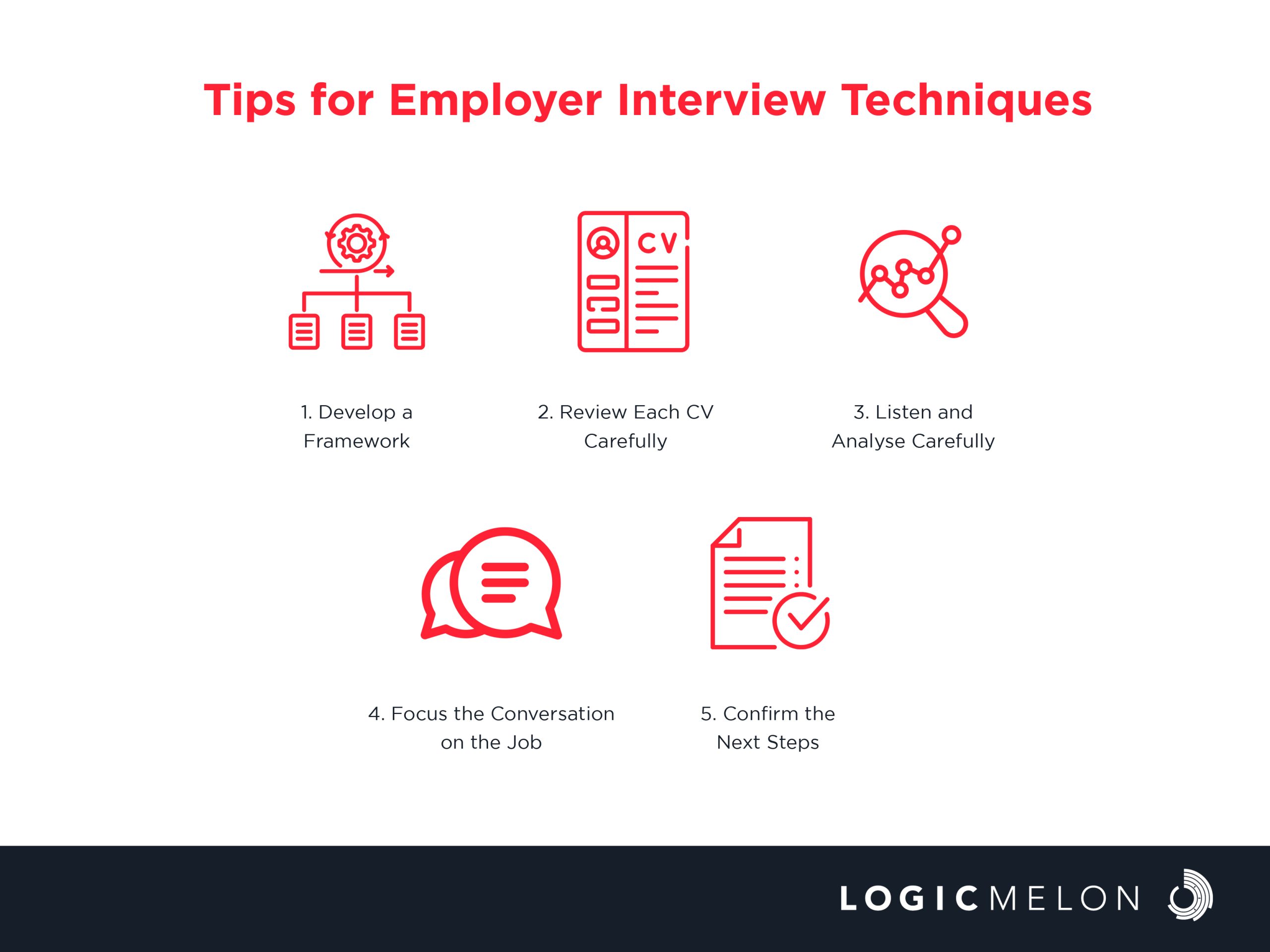5 Fun and Engaging Employer Interview Techniques
Interviews can be nerve-wracking for both the interviewer and the interviewee, but they don’t have to be! With the right employer interview techniques, you can conduct an effective and successful interview and find the best candidate for the job. Here are five tips for employer interview techniques that will make the process more fun and engaging for everyone involved.

1. Develop a Dynamic Framework
The first step in employer interview techniques is a structured approach that can help you cover all the essential materials quickly without missing any critical details or getting sidetracked by a candidate. Start with an overview of the organisation and job responsibilities, then move on to asking questions of the candidates and checking if they have any queries. By explaining the interviewing process to the candidates, everyone stays on the same page.
2. Check Out Those CVs
Take the time to go through each candidate’s CV before the interview. Not only will it help you avoid asking questions that are already answered in the CV, but it will also ensure that you ask any relevant questions about the candidate’s skills. Make notes about the candidate at the end of each interview to avoid forgetting important details.
3. Listen Up!
Listening is essential to effective interview strategies. Pay attention to the language being used by the candidate when speaking, their body language, and how they respond to your questions. By focusing on what the candidate is saying at the moment, you can glean important insights that will help you make the right decision.
4. Keep it Job-Related
While it’s tempting to ask candidates about their interests and hobbies, it’s best to stick to questions about the job. Remember, the goal is to hire the best candidate for the position, not necessarily the one you like the most. Keep the conversation on track by reminding yourself of your planned discussion points.
5. Follow Up Like a Pro
After the interview, be sure to outline how you will contact each candidate and commit to responding to them by the deadline. Not only does this show that you’re organised and professional, but it also reflects positively on your organisation.
Bonus Tip: Employer Interview Techniques Over the Phone
The phone interview is often the first stage of the interview process, and it’s a critical one. Here are three techniques for conducting successful phone interviews:
- Prepare your questions in advance and stick to them. Focus on the abilities and qualities required for the job, and avoid changing your questions based on the person.
- Be flexible and understanding of the candidate’s schedule and provide them with various appointment times and dates or ask them when they are free.
- Allow candidates to ask questions throughout the call, or set aside time at the end of the interview. It shows that you’re interested and engaged.
Bonus Tip: Behavioural Employer Interview Techniques
Behavioural interviews are a little more abstract than traditional interviews, but they can be incredibly effective in selecting the most qualified applicant. Here are three techniques for conducting successful behavioural interviews:
- Choose your questions wisely and formulate your questions based on your company’s culture and the position you are hiring for. The questions should be designed to assess whether the candidate is an excellent cultural fit.
- Stay consistent with the same questions to all candidates to evaluate their answers effectively.
- Build a collaborative team. Collaborators can help you interpret the candidate’s responses and make informed decisions.
Frequently Asked Questions about Conducting Successful Interviews
1. How can employers conduct successful interviews?
Don’t just grill your candidates with tough questions! First, make sure you create a comfortable environment and build a rapport with them. Show them around the workplace and highlight your company’s unique culture. By connecting with your candidates, you can get a better sense of their personalities and whether they will be a good fit for the job.
2. What are some common interview mistakes to avoid?
Showing up too early or too late for an interview can be a big red flag for employers. Make sure to arrive on time and dress appropriately. It’s also important to avoid asking discriminatory or inappropriate questions. Remember, the goal is to make the candidate feel comfortable and show that your company is a professional and welcoming place to work.
3. How do you wrap up an interview and leave a positive impression on candidates?
It’s always a good idea to thank the candidate for their time and express your appreciation for their interest in the position. Encourage them to ask any remaining questions and make sure to address any concerns they may have. By wrapping up the interview on a positive note, you can leave a lasting impression on the candidate and make them more likely to accept a job offer if it’s extended.
Closing Thoughts
Interviewing can be stressful for both employers and candidates. However, with the right employer interview techniques and preparation, you can make the process smoother and more enjoyable for everyone involved. By creating a comfortable environment, avoiding common mistakes, and leaving a positive impression, you can attract the best candidates and build a strong reputation for your company. So go ahead, start practicing your interviewing skills and get ready to make a great hire!
LogicMelon
Award-winning recruitment software that will find, attract, hire and analyse the way you want to work. At LogicMelon, we have experienced software recruitment marketing specialists to help you build effective recruitment solutions supported by the best customer service you’ll find anywhere!
Email: [email protected] or call LogicMelon (UK) +44 (0) 203 553 3667 (USA) +1 860 269 3089
Recruitment Data Visualisation: Everything You Must Know
As a recruiter, you go through a lot of information daily. Recruitment data visualisation simplifies the complex data, making it easier to understand and act upon.
The Role of Soft Skills in Leadership Recruitment
In leadership development, soft skills are essential for identifying individuals who can not only manage but also inspire and guide teams to success.
ATS and CRM in Talent Acquisition
By utilising the strengths of ATS and CRM, organisations can create a comprehensive talent acquisition strategy that combines relationship building with an efficient hiring process.


